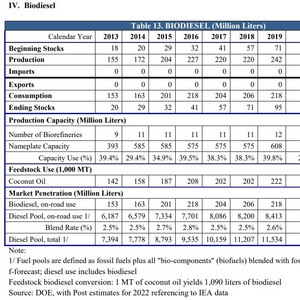Biodiesel consumption in the Philippines to increase in 2022

September 6, 2022
BY Erin Krueger
Biodiesel consumption in the Philippines is expected to expand by 31 percent in 2022, according to a report filed with the USDA Foreign Agricultural Service’s Global Agricultural Information Network. The increase is primarily attributed to a projected movement from B2 to B5 and increased fuel use due to economic growth.
The country currently has 13 biodiesel plants with a combined 708 million liters of nameplate capacity. Both the number of biorefineries and capacity has held steady since 2020. Capacity use is expected to be at 35 percent this year, up from 28 percent in 2021 and 26.6 percent in 2020.
Advertisement
Production is expected to reach 248 million liters this year, up from 191 million liters in 2021 and 161 million liters in 2020, Domestic biodiesel production currently relies on coconut oil feedstock, with 228,000 metric tons expected to be consumed this year.
The Philippines is expected to consume 250 million liters (66.04 million gallons) of biodiesel this year, up from 129 million liters in 2021 and 122 million liters in 2020. Biodiesel is expected to account for 3 percent of diesel fuel use this year, up from 2.6 percent in 2021 and 2.5 percent in 2020.
The Philippines is not expected to import or export any biodiesel in 2022.
Advertisement
To reach a target biodiesel blend of 5 percent, the report estimates that 683 million liters of the fuel will be needed next year, increasing to 717 million liters in 2024, 745 million liters in 2025 and 777 million liters in 2026.
A full copy of the report can be downloaded from the USDA FAS GAIN website.
Related Stories
CountryMark on July 22 celebrated the completion of more than $100 million in upgrades at its refinery in Indiana, including those related to soybean oil storage. The facility produces renewable diesel via coprocessing technology.
ATOBA Energy and Air Moana are partnering to implement scalable solutions for the supply of SAF. The collaboration aims to ensure long-term SAF availability while supporting local initiatives to develop sustainable fuel production in Tahiti.
While final IRS guidance is still pending, the foundation of the 45Z program is well defined. Clean fuel producers should no longer be waiting; they can now move forward with critical planning and preparation, according to EcoEngineers.
Neste Corp. on July 24 released second quarter results, reporting record quarterly renewable product sales volumes despite weaker margins. SAF sales were up nearly 80% when compared to the first quarter of 2025.
Valero Energy Corp. on July 24 released second quarter results, reporting a profitable three-month period for its ethanol segment. The renewable diesel segment posted a loss, but the company’s new sustainable aviation fuel (SAF) unit operated well.
Upcoming Events










